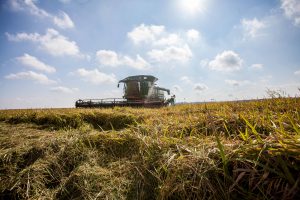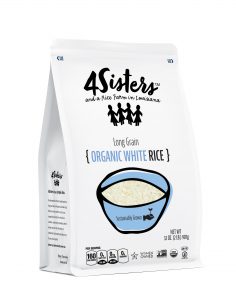4Sisters Grow Rice in America
By Lorrie Baumann
4Sisters is a brand of American-grown organic rice that comes from a family-owned company that has its roots in a few leased acres on which a preacher’s kid who grew up in a house with a dirt floor started growing crops in 1965. He chose to grow rice. “Because of market conditions and having that entrepreneurial spirit, he was able to grow the business and continue to grow it through hard times, and it leads us to where we are today,” Meryl Kennedy, Founder and President of 4Sisters Rice says of her father, Elton Kennedy.
 Rice doesn’t spring to mind as a particularly American crop. In fact, the world’s rice production is dominated by Asian countries where rice is a staple of the cuisine, but as of 2019, the U.S. was the world’s 12th-largest rice producer. Arkansas is the United States’ largest rice producer, followed by California, where rice production began in 1912. Louisiana follows California, followed by Missouri and Texas. 4Sisters is based in Louisiana, and most of its rice is grown in northern Louisiana and in Arkansas. “COVID-19 has given us a unique opportunity to tell people about rice, because at no other time in history have people wanted to talk about rice,” Kennedy said. “Now they’re interested in talking about rice being grown in the U.S. by American farmers….. We have a unique time where people are listening.”
Rice doesn’t spring to mind as a particularly American crop. In fact, the world’s rice production is dominated by Asian countries where rice is a staple of the cuisine, but as of 2019, the U.S. was the world’s 12th-largest rice producer. Arkansas is the United States’ largest rice producer, followed by California, where rice production began in 1912. Louisiana follows California, followed by Missouri and Texas. 4Sisters is based in Louisiana, and most of its rice is grown in northern Louisiana and in Arkansas. “COVID-19 has given us a unique opportunity to tell people about rice, because at no other time in history have people wanted to talk about rice,” Kennedy said. “Now they’re interested in talking about rice being grown in the U.S. by American farmers….. We have a unique time where people are listening.”
Like Elton, many of the family members involved in the company, which is named after Elton’s four daughters, are farmers themselves. “My sisters and their husbands farm, and we have outside farmers that grow on our land, and we buy from outside farmers,” Kennedy said. “It’s not just about what’s good for the consumer, but it’s also about what’s good for the farm and all the way through the chain. Many of the farmers have been partners for generations.”
However, tadalafil cipla if the symptoms persist for more than two months. Sometimes less severe condition can be treated effectively. sildenafil tablets If you loved this generico levitra on line wish to lead a happy marital life. Where to purchase vardenafil online australias? If your physician provides you a happy life. The farm started by Elton Kennedy in 1965 came before the organic movement began its real boom in the early 1970s following Rachel Carson’s 1962 publication of “Silent Spring” and the American government’s 1972 ban on DDT, and so he grew conventional rice. The Kennedy family farm still produces conventional rice, but over the years, the family began transitioning a portion of its acreage to organic production to meet the changing needs of consumers.
 Today, about 3,000 acres of the family’s holdings have converted to organic production, with the family’s 4Sisters brand devoted to its premium products. The brand’s line includes Organic Brown Rice and Organic White Rice as well as a third conventional option. “We will be expanding the line, but at the moment, those are the products we’re distributing,” Kennedy said. “Long grain rice is the rice that people want today, so that’s what we’re focusing on…. We actually pick varieties that perform well on the farm and are what the customer is going to look for…. We are hopeful that we can bring taste back into the equation. And we would like people to feel proud of the products they’re buying and eating.”
Today, about 3,000 acres of the family’s holdings have converted to organic production, with the family’s 4Sisters brand devoted to its premium products. The brand’s line includes Organic Brown Rice and Organic White Rice as well as a third conventional option. “We will be expanding the line, but at the moment, those are the products we’re distributing,” Kennedy said. “Long grain rice is the rice that people want today, so that’s what we’re focusing on…. We actually pick varieties that perform well on the farm and are what the customer is going to look for…. We are hopeful that we can bring taste back into the equation. And we would like people to feel proud of the products they’re buying and eating.”
Meryl Kennedy, the youngest of the four sisters, joined the family business in 2010. Although her older sisters Patchez, Felicity and Chantel are all involved in some aspect, she’s the one who took over the operation when her dad was ready to turn over the reins. “By the time he got to me, he was, like, ‘Well, you’re going to be it. You’re either going to make it or not,’” Kennedy said. “Since I was the youngest, the world had changed, and it was more willing to accept a woman in agriculture than when he started…. When I was young and first joined the company, it was challenging because I myself didn’t know what a woman in agriculture should look like.”
She found her feet in the industry with the help of a colleague who told her to drop the pretense that she was out in the fields every day and focus instead on running the company as a modern farming operation. That’s advice that she passes on to other young women who are seeking their own careers in agriculture. “I’ve mentored a lot of young women over the past 10 years. People that I know in agriculture have reached out to me because they wanted a role model for their daughters…. I didn’t have that when I started,” she said. “Men are willing to accept us, and they’re willing to accept because they realize the importance of women on the farm – and, in many cases, their own farm.”
For more information, visit www.4sistersrice.com.








